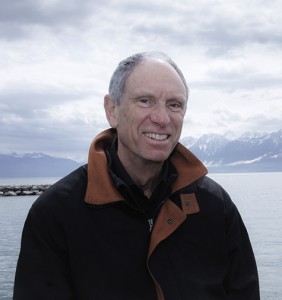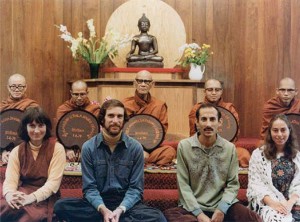What to Pack
 I am now in serious getting-ready-to-go-on-retreat mode. I leave this Saturday for a month-long retreat at Spirit Rock. Mostly, a month-long retreat is just like a week-long retreat…except, of course, longer. But there are a few “special features.” One of which is the issue of laundry.
I am now in serious getting-ready-to-go-on-retreat mode. I leave this Saturday for a month-long retreat at Spirit Rock. Mostly, a month-long retreat is just like a week-long retreat…except, of course, longer. But there are a few “special features.” One of which is the issue of laundry.
Here’s what Spirit Rock has to say: “The month long retreats are the ONLY retreats that we are able to do laundry for the participants. Clothing, socks, and underwear are washed one week. Personal sheets, towels, socks, and underwear the alternate week. It is important to bring enough clothes for 2 weeks. You can do your own hand washing outside of this schedule. We have drying racks outside on each floor of each dorm. BEFORE YOU ARRIVE: Label all your clothing with an indelible marker, or tag, that will not come off in the laundry cycle. You can bring a small mesh bag labeled with your name for your undergarments. Washing of personal items will NOT be done the last week of the retreat.”
Here’s what I know from personal experience: Don’t bring anything that’s your “favorite” — or that can’t be washed by you personally in a tiny little sink — because they’re doing laundry for 100 people every week and stuff gets messed up. Also, don’t think they’re kidding about putting your name on your clothes. (You definitely won’t be the only one wearing black yoga pants.) And lastly, don’t be surprised if it takes a few days to get some of your stuff back…even with your name on it. Those mesh bags of undies look a lot more alike than you’d think!
In One’s Own Mind
 A little more today from the Tricycle interview with Joseph Goldstein:
A little more today from the Tricycle interview with Joseph Goldstein:
“One of the qualities that has sustained my practice over these many years is a tremendous interest in, even fascination with, the nature of mind. What is this experience we call mind? What is mind as a phenomenon? What actually IS awareness or consciousness?
“This is such a powerful arena of investigation. And what thoughts and emotions influence and color this mind? We can see that our whole life, our whole word, in one way or another is a manifestation of mind.
“From one perspective, we could say that what’s going on in the world is a galactic battle of mental factors. There’s greed and desire and fear and love and compassion and mindfulness, and they’re all playing themselves out in this vast sphere of empty awareness.
“For me, its completely fascinating to see in this mind both the potential for huge suffering and the potential for enlightenment, awakening, and all kinds of happiness. And to see that this is one’s own life. It’s one’s own mind!”
“Retreat” vs. “Real Life”
 At next Sunday Sangha, I’m thinking of reading from an excellent interview with Joseph Goldstein that just came out in the Spring issue of Tricycle magazine.
At next Sunday Sangha, I’m thinking of reading from an excellent interview with Joseph Goldstein that just came out in the Spring issue of Tricycle magazine.
Here’s a sample:
Interviewer: “I often hear people draw a distinction between ‘retreat’ and ‘real life’. As someone who has devoted a good deal of his life in retreat, or creating a place for people to enter into long-term retreat, how would you respond to this distinction?”
Joseph: “Slightly tongue-in-cheek I would say that really, retreat is real life and non-retreat isn’t. It’s more likely on retreat that we’re living in awareness of what’s happening–more so than when we’re busy in the world.
“So in that sense we are connected with the reality of what’s going on more on retreat, and in our busy lives in the world we’re more often caught up in the stories and in the movies of our mind, which in a certain sense in not the real world; its just the world of our mental projections. That’s the more superficial response.
“The fuller response, I think, is that in a very basic way it’s a false distinction. The mind-body process is working all the time, whatever we’re doing. It doesn’t stop when we’re on retreat and start again when we’re out in the world, or reverse. It’s the same process going on all the time.
“The real question, whether we’re on retreat or out in the world, is: Are we aware of this mind-body process or not? Are we being mindful of what’s happening or not?”
***
There’s a lot more. Click here to read the full interview.
Even the Birds Came to Listen
 Last night I listened (again) to a terrific talk by Ajahn Sucitto given at a recent retreat held (I think) in Thailand….you can hear tropical birds in the background!….in which there was so much wisdom and inspiration and helpful instruction to be taken in — and to be enjoyed — that I’m sure I’ll listen to it again.
Last night I listened (again) to a terrific talk by Ajahn Sucitto given at a recent retreat held (I think) in Thailand….you can hear tropical birds in the background!….in which there was so much wisdom and inspiration and helpful instruction to be taken in — and to be enjoyed — that I’m sure I’ll listen to it again.
Just one of the things he talked about that I found so intriguing was that there is a difference between the physical body (which ages and sag and basically falls apart) and the sensory body (which does NOT age, sag or fall apart — but which actually gets BETTER!). The physical body is what we see when we look in the mirror; the sensory body is what we feel when we sit in meditation. He talked about finding what is comfortable/pleasurable/beautiful in the sensory body and then spreading that comfort and ease into those parts that feel tight or constricted by remembering the wholesome intentions we’ve set to be open and accepting.
“Attention follows intention,” he said. Which is just one of the little jewels I’ve taken to heart from the talk.
I could go on and on…but Ajahn Sucitto does it WAY better. Listen to it here. (And thanks, Carolyn, for turning me on to that talk!)
Extravagant Gesture
 I’m not quite sure why this poem speaks to me today. But it does. So I offer it to you. This is not an extravagant gesture, I know, but generous I hope, and not wasted.
I’m not quite sure why this poem speaks to me today. But it does. So I offer it to you. This is not an extravagant gesture, I know, but generous I hope, and not wasted.
Wasteful Gesture Only Not
by Tony Hoagland
Ruth visits her mother’s grave in the California hills.
She knows her mother isn’t there but the rectangle of grass
marks off the place where the memories are kept,
like a library book named Dorothy.
Some of the chapters might be: Dorothy:
Better Bird-Watcher Than Cook;
Dorothy, Wife and Atheist;
Passionate Recycler Dorothy, Here Lies But Not.
In the summer hills, where the tall tough grass
reminds you of persistence
and the endless wind
reminds you of indifference,
Ruth brings batches of white roses,
extravagant gesture not entirely wasteful
because as soon as she is gone she knows
the deer come out of the woods to eat them.
What was made for the eye
goes into the mouth,
thinks Ruth to herself as she drives away,
and in bed when she tries to remember her mother,
she drifts instead to the roses,
and when she thinks about the roses she
sees instead the deer chewing them–
the pale petals of the roses in the dark
warm bellies of the sleeping deer–
that’s what going to sleep is like.
A Bunch of Crazy Kids
 Forty years ago a group of kids in their 20’s — Sharon Salzberg, Joseph Goldstein, Jack Kornfield and a few others — having studied/practiced Buddhist meditation in Thailand and India — had the crazy idea of opening a meditation retreat center in the US.
Forty years ago a group of kids in their 20’s — Sharon Salzberg, Joseph Goldstein, Jack Kornfield and a few others — having studied/practiced Buddhist meditation in Thailand and India — had the crazy idea of opening a meditation retreat center in the US.
The Insight Meditation Society (IMS) website tells the story like this: “On hearing of a Catholic novitiate for sale in Barre, Massachusetts, they came to take a look. As they traveled through the picturesque New England town, its motto, displayed on the town common, came into view: Tranquil and Alert. This seemed a fitting sign and captured the spirit of meditation. Generous friends and supporters provided enough funds to purchase the property, priced at $150,000. And on February 14, 1976, a small band of teachers and staff opened the center.”
As Sharon likes to say, “For the first 20 years or so, IMS was run without any adult supervision.” Joseph adds, “There were many ups and downs, but somehow, with the help of many people, 40 years later we’re really in a good place.”
Click here for a great little video celebrating IMS’ 40th Birthday. Click here for more information and to see photos of these “kids” and the center they built, over the past four decades.
Happy Birthday, IMS!
I Love You Guys!
 To all you Citizens of Dharma Town…by which I mean anyone who has ever read DharmaTown Times, or checked out the Neighborhood Sitting Groups, stopped in at Cinema Nibbana for a preview of Coming Attractions, pulled up a seat at Cafe Sangha, browsed through the offerings at Dharma Town Library or visited any of our other fine local establishments….. I just want to say: I love you guys!!!!
To all you Citizens of Dharma Town…by which I mean anyone who has ever read DharmaTown Times, or checked out the Neighborhood Sitting Groups, stopped in at Cinema Nibbana for a preview of Coming Attractions, pulled up a seat at Cafe Sangha, browsed through the offerings at Dharma Town Library or visited any of our other fine local establishments….. I just want to say: I love you guys!!!!
In the Garden
 I’ll be sitting the March month-long retreat at Spirit Rock and have been “getting into the groove” by listening to talks from the February month-long retreat going on right now. The talk I listened to last night was particularly lovely. It was given by Guy Armstrong and the title is The Power of Lovingkindness. In it, he quotes this poem by Shams of Tabriz:
I’ll be sitting the March month-long retreat at Spirit Rock and have been “getting into the groove” by listening to talks from the February month-long retreat going on right now. The talk I listened to last night was particularly lovely. It was given by Guy Armstrong and the title is The Power of Lovingkindness. In it, he quotes this poem by Shams of Tabriz:
I, You, He, She, We….
In the garden of mystic lovers,
These are not true distinctions.
Thank the Steady Effort
How Rarely I Have Stopped to Thank the Steady Effort
by Jane Hirshfield
A person speaking
pauses, lets in
a little silence-portion with the words.
It is like an hour.
Any hour. This one.
Something happens, much does not.
Or as always, everything happens:
the standing walls keep standing with their whole attention.
A noisy crow call lowers and lifts its branch,
the crow scent enters the leaves, enters the bark,
like stirred-in honey gone into the tea.
How rarely I have stopped to thank
the steady effort of the world to stay the world.
To thank the furnish of green
and the abandon of yellow. The ancient Sumerians
called the beloved ‘Honey’, as we do.
Said also, ‘Borrowed bread is not returned.’
Like them, we pay love’s tax to bees,
we go on arranging the old notes in different orders.
Desire inside ACAGGAT.
Forgiveness in GTACTT.
In a world of space and time, arrangement matters.
An hour has no front or back,
except to those whose eyes face forward,
whose tears blur thought and stars.
Five genes, in a certain arrangement,
will spend this life unrooted, grazing.
It has to do with how the animal body comes into being,
the same whether ant or camel.
What then does such unfolded code understand,
if it finds in its mouth the word important—
the thing that can be carried, or the thing that cannot,
or the way they keep trading places,
grief and gladness, the comic, the glum, the dead, the living.
Last night, the big Sumerian moon
clambered into the house empty-handed
and left empty-handed,
not thief, not lover, not tortoise, just looking around,
shuffling its soft, blind slippers over the floor.
This felt, to me, important, and so I looked back with both hands
open, palms unblinking.
What caused the fire, we ask, meaning,
lightning, wiring, matches.
How precisely and unbidden
oxygen slips itself into, between those thick words.
Yay Bliss! Yay Rapture!
 Next week the Monday night KM Book Group will be talking about Rapture. (It’s chapter 28 in Mindfulness: A Practical Guide to Awakening by Joseph Goldstein). “Rapture” is the traditional translation of the Pali word “piti,” which can also be translated as “happiness,” “joy,” “delight,” and “pleasurable or rapt interest.” It’s one of the mental factors that lead to awakening (along with mindfulness, investigation, energy, calm, concentration, and equanimity.)
Next week the Monday night KM Book Group will be talking about Rapture. (It’s chapter 28 in Mindfulness: A Practical Guide to Awakening by Joseph Goldstein). “Rapture” is the traditional translation of the Pali word “piti,” which can also be translated as “happiness,” “joy,” “delight,” and “pleasurable or rapt interest.” It’s one of the mental factors that lead to awakening (along with mindfulness, investigation, energy, calm, concentration, and equanimity.)
Joseph writes that one of the ways we can strengthen this quality of mind is to reflect on our commitment to not cause harm (“sila” in Pali). This is often referred to as the Bliss of Blamelessness and it usually means following the Five Precepts, which are traditionally translated as:
(1) I undertake the training to avoid the killing of beings
(2) I undertake the training to avoid taking things that are not given
(3) I undertake the training to avoid sexual misconduct
(4) I undertake the training to refrain from false speech
(5) I undertake the training to abstain from substances which cause intoxication and heedlessness
When I was in the Dedicated Practitioner Program, we were asked to re-write these precepts in our own words. Here’s my version:
(1) For my own peace of mind and for the peace of others, I will practice compassion by not killing or intentionally harming any living being
(2) For my own contentment and for the contentment of others, I will practice generosity by not taking what is not freely given
(3) For my own well-being and for the well-being of others, I will practice lovingkindness by not engaging in sexuality that is harmful
(4) For my own happiness and for the happiness of others, I will practice honesty and goodwill by not speaking in ways that are false, harsh, divisive or mindless
(5) For my own safety and for the safety of others, I will practice restraint by not clouding my mind with intoxicants
***
I take these precepts every morning. Sometimes I just say them without thinking. But mostly I really mean what I’m saying and I’ve found that it’s had a much bigger-than-expected effect on how I live in the world. And I have to admit…reflecting on that change in my life is kind of blissful.

